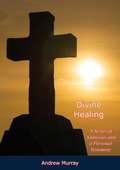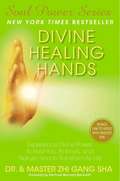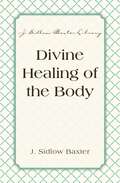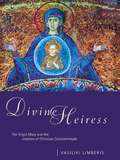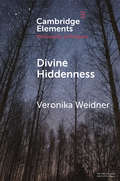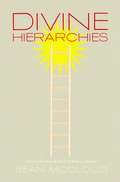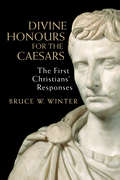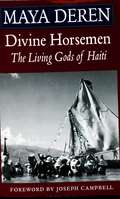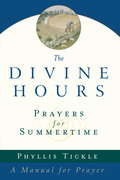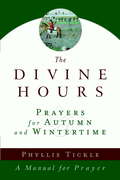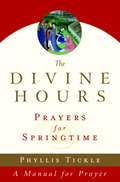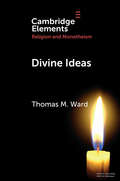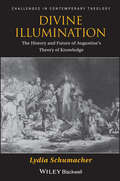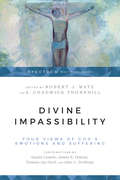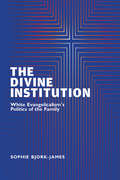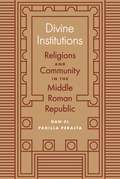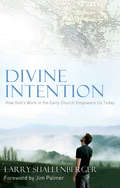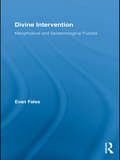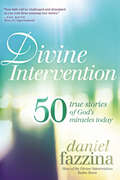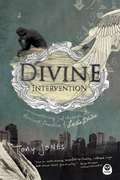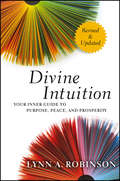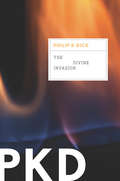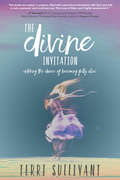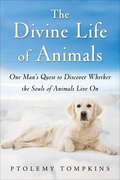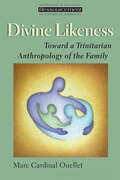- Table View
- List View
Divine Healing: A Series of Addresses and a Personal Testimony
by Andrew MurrayIn this concise and easily understood volume Murray covers scripture in both the Old and New Testaments proving that healing is provided in the death of Christ, that it is God’s will to heal, that laying-on of hands and confession of sin are the way to healing and that sickness is related to sin.Though written some time ago, this book is for today! It will answer pertinent questions people are asking as they experiment with using the power of Christ to heal themselves and others.
Divine Healing Hands
by Zhi Gang ShaHumanity and Mother Earth are suffering. Divine Healing Hands are given in this special time. Serve humanity. Serve Mother Earth. Millions of people are suffering in their spiritual, mental, emotional, and physical bodies. Millions of people have challenges in their relationships and finances. Millions of people are searching for spiritual secrets, wisdom, knowledge, and practical techniques in order to fulfill their spiritual journeys. For the first time, the Divine is giving his Divine Healing Hands to the masses. Divine Healing Hands carry divine healing power to heal and to transform relationships and finances. Dr. & Master Zhi Gang Sha is a chosen servant, vehicle, and channel of the Divine to offer Divine Healing Hands to the chosen ones. Master Sha has asked the Divine to download Divine Healing Hands to every copy of this book. Every reader can experience the amazing power of Divine Healing Hands directly. In this tenth book of Master Sha's bestselling Soul Power Series, readers will also be deeply moved by the many heart-touching stories of divine healing and transformation created by this divine treasure. To receive Divine Healing Hands is to serve humanity and the planet in this critical time. The purpose of life is to serve. Learn how you can receive Divine Healing Hands. Answer the Divine's calling. You can make a difference on a scale beyond comprehension and imagination.
Divine Healing Of The Body (J. Sidlow Baxter Library)
by J. Sidlow BaxterDivine Healing of the Body covers the history of healing through the centuries as well as how divine healing is present today through the Atonement, and how we experience divine healing today.
Divine Heiress: The Virgin Mary and the Making of Christian Constantinople
by Vasiliki LimberisDivine Heiress explores the vital role of the Virgin Mary in the cultural and religious life of Constantinople in late antiquity. It shows how she was transformed from a humble Jewish maiden into a divine figure and supernatural protector of Constantinople.Vasiliki Limberis examines the cult of Mary in the context of the religious culture of the Mediterranean world and the imperial Christianity of the Roman Empire. The author looks at all the evidence for the cult but pays particular attention to the early hymns to the virgin. These hymns preserved the strong indigenous goddess traditions of Demeter/Persephone, Isis, Hecate and Athena. By studying them the author places the cult of Mary in its historical and cultural context.
Divine Hiddenness (Elements in the Philosophy of Religion)
by Veronika WeidnerThis Element provides an introduction to the hiddenness argument, as presented by John Schellenberg, and its up-to-date discussion in a comprehensible way. It concludes with a brief assessment of where things stand, from the author's point of view, and why divine hiddenness should not reduce a reflective theist's confidence in theism.
Divine Hierarchies
by Sean MccloudPlacing the neglected issue of class back into the study and understanding of religion, Sean McCloud reconsiders the meaning of class in today's world. More than a status grounded in material conditions, says McCloud, class is also an identity rhetorically and symbolically made and unmade through representations. It entails relationships, identifications, boundaries, meanings, power, and our most ingrained habits of mind and body. He demonstrates that employing class as an analytical tool that cuts across variables such as creed, race, ethnicity, and gender can illuminate American religious life in unprecedented ways.Through social theory, historical analysis, and ethnography, McCloud makes an interdisciplinary argument for reinserting class into the study of religion. First, he offers a new three-part conception of class for use in studying religion. He then presents a focused cultural history of religious studies by examining how social class surfaced in twentieth-century theories of religious affiliation. He concludes with historical and ethnographic case studies of religion and class. Divine Hierarchies makes a convincing case for the past and present importance of class in American religious thought, practice, and scholarship.
Divine Honours for the Caesars: The First Christians' Responses
by Bruce W. WinterThough the first century a.d. saw the striking rise and expansion of Christianity throughout the vast Roman Empire, ancient historians have shown that an even stronger imperial cult spread far more rapidly at the same time. How did the early Jesus-followers cope with the all-pervasive culture of emperor worship? This authoritative study by Bruce Winter explores the varied responses of first-century Christians to imperial requirements to render divine honours to the Caesars. Winter first examines the significant primary evidence of emperor worship, particularly analysing numerous inscriptions in public places and temples that attributed divine titles to the emperors, and he then looks at specific New Testament evidence in light of his findings.
Divine Horsemen: The Living Gods of Haiti
by Maya DerenMaya Deren's Divine Horsemen is a primary source book on the culture and spirituality of Haitian Voudoun. The work includes all the original photographs and illustrations, glossary, appendices and index.
The Divine Hours: Prayers for Summertime (Divine Hours)
by Phyllis TickleThe first volume in a trilogy of prayer manuals compiled by Publishers Weekly religion editor Phyllis Tickle as a contemporary Book of Hours to guide Christians gently yet authoritatively through the daily offices.The Divine Hours is the first major literary and liturgical reworking of the sixth-century Benedictine Rule of fixed-hour prayer. This beautifully conceived and thoroughly modern three-volume guide will appeal to the theological novice as well as to the ecclesiastical sophisticate. Making primary use of the Book of Common Prayer and the writings of the Church Fathers, The Divine Hours is also a companion to the New Jerusalem Bible, from which it draws its Scripture readings. The trilogy blends prayer and praise in a way that, while extraordinarily fresh, respects and builds upon the ancient wisdom of Christianity.The first book in the set, Prayers for Summertime, filled with prayers, psalms, and readings, is one readers will turn to again and again. Compact in size, it is perfect for those seeking greater spiritual depth. As a contemporary Book of Hours, The Divine Hours: Prayers for Summertime heralds a renewal of the tradition of disciplined daily prayer, and will whet the hunger of a large and eager audience for the follow-up autumn/winter and spring volumes.
The Divine Hours: Prayers for Autumn and Wintertime (Divine Hours)
by Phyllis TickleThe second volume in a trilogy of prayer manuals compiled by Publishers Weekly religion editor Phyllis Tickle as a contemporary Book of Hours to guide Christians gently yet authoritatively through the daily offices.The Divine Hours is the first major literary and liturgical reworking of the sixth-century Benedictine Rule of fixed-hour prayer. This beautifully conceived and thoroughly modern three-volume guide will appeal to the theological novice as well as to the ecclesiastical sophisticate. Making primary use of the Book of Common Prayer and the writings of the Church Fathers, The Divine Hours is also a companion to the New Jerusalem Bible, from which it draws its Scripture readings. The trilogy blends prayer and praise in a way that, while extraordinarily fresh, respects and builds upon the ancient wisdom of Christianity. The second book in the set, Prayers for Autumn and Wintertime, provides prayers, psalms, and readings for these two festive seasons. Compact, it is perfect for those seeking greater spiritual depth. As a contemporary Book of Hours, The Divine Hours: Prayers for Autumn and Wintertime heralds a renewal of the tradition of disciplined daily prayer, and gives those already using the first volume the continuity they are seeking. The series will culminate in a third volume for springtime, completing the liturgical and calendar year with the offices for every day.From the Trade Paperback edition.
The Divine Hours (Volume Three): A Manual for Prayer
by Phyllis TickleThe third and final volume in a trilogy of prayer manuals compiled by Publishers Weekly religion editor Phyllis Tickle as a contemporary Book of Hours to guide Christians gently yet authoritatively through the daily offices.The Divine Hours is the first major literary and liturgical reworking of the sixth-century Benedictine Rule of fixed-hour prayer. This beautifully conceived and thoroughly modern three-volume guide will appeal to the theological novice as well as to the ecclesiastical sophisticate. Making primary use of the Book of Common Prayer and the writings of the Church Fathers, The Divine Hours is also a companion to the New Jerusalem Bible, from which it draws its Scripture readings. The trilogy blends prayer and praise in a way that, while extraordinarily fresh, respects and builds upon the ancient wisdom of Christianity. The third and final book in the set, Prayers for Springtime, provides prayers, psalms, and readings for this season associated with rebirth. Compact, it is perfect for those seeking greater spiritual depth. As a contemporary Book of Hours, The Divine Hours: Prayers for Springtime heralds a renewal of the tradition of disciplined daily prayer, and gives those already using the first two volumes the completion they are seeking. With this volume, the series culminates with three prayer manuals encompassing the liturgical and calendar year with the offices for every day.
Divine Ideas (Elements in Religion and Monotheism)
by Thomas M. WardThis Element defends a version of the classical theory of divine ideas, the containment exemplarist theory of divine ideas. The classical theory holds that God has ideas of all possible creatures, that these ideas partially explain why God's creation of the world is a rational and free personal action, and that God does not depend on anything external to himself for having the ideas he has. The containment exemplarist version of the classical theory holds that God's own nature is the exemplar of all possible creatures, and therefore that God's ideas of possible creatures are in some sense ideas of himself. Containment exemplarism offers a monotheism fit for metaphysics, insofar as it is coherent, simple, and explanatorily powerful; and offers a metaphysics fit for monotheism, insofar as it leaves God truly worthy of the unconditional worship which Christians, along with Jews and Muslims, aspire to offer to God.
Divine Illumination: The History and Future of Augustine's Theory of Knowledge (Challenges In Contemporary Theology Ser. #27)
by Lydia SchumacherIn Divine Illumination, Schumacher offers an original approach to Augustine's theory of divine illumination, the precondition of all human knowledge. Written with great originality and clarity, she traces the idea through medieval thinkers, into early modernity, and reveals its importance in modern theories of knowledge. Takes an original approach to reading Augustine's theory of divine illumination and shows how the theory was transformed and reinterpreted in medieval philosophy and theology Presents a groundbreaking way of thinking about the writings of Augustine, Anselm, Bonaventure, Aquinas, and John Duns Scotus, and relates this to cutting edge questions in contemporary philosophy of religion, especially epistemology Is a significant contribution to the history of philosophy but also to contemporary debates on faith and reason Lays the foundation for future efforts to come to terms with the contemporary epistemological situation and its inherent problems
Divine Impassibility: Four Views of God's Emotions and Suffering (Spectrum Multiview Books)
by Robert J. Matz A. Chadwick ThornhillDoes God suffer? Does God experience emotions? Does God change?Views and Contributors:Strong Impassibility (James E. Dolezal, assistant professor in the School of Divinity at Cairn University)Qualified Impassibility (Daniel Castelo, professor of dogmatic and constructive theology at Seattle Pacific University)Qualified Passibility (John C. Peckham, professor of theology and Christian philosophy at Andrews University)Strong Passibility (Thomas Jay Oord, professor of theology and philosophy at Northwest Nazarene University
The Divine Institution: White Evangelicalism's Politics of the Family
by Sophie Bjork-JamesThe Divine Institution provides an account of how a theology of the family came to dominate a white evangelical tradition in the post-civil rights movement United States, providing a theological corollary to Religious Right politics. This tradition inherently enforces racial inequality in that it draws moral, religious, and political attention away from problems of racial and economic structural oppression, explaining all social problems as a failure of the individual to achieve the strong gender and sexual identities that ground the nuclear family. The consequences of this theology are both personal suffering for individuals who cannot measure up to prescribed gender and sexual roles, and political support for conservative government policies. Exposure to experiences that undermine the idea that an emphasis on the family is the solution to all social problems is causing a younger generation of white evangelicals to shift away from this narrow theological emphasis and toward a more social justice-oriented theology. The material and political effects of this shift remain to be seen.
Divine Institutions: Religions and Community in the Middle Roman Republic
by Dan-el Padilla PeraltaHow religious ritual united a growing and diversifying Roman RepublicMany narrative histories of Rome's transformation from an Italian city-state to a Mediterranean superpower focus on political and military conflicts as the primary agents of social change. Divine Institutions places religion at the heart of this transformation, showing how religious ritual and observance held the Roman Republic together during the fourth and third centuries BCE, a period when the Roman state significantly expanded and diversified.Blending the latest advances in archaeology with innovative sociological and anthropological methods, Dan-el Padilla Peralta takes readers from the capitulation of Rome's neighbor and adversary Veii in 398 BCE to the end of the Second Punic War in 202 BCE, demonstrating how the Roman state was redefined through the twin pillars of temple construction and pilgrimage. He sheds light on how the proliferation of temples together with changes to Rome's calendar created new civic rhythms of festival celebration, and how pilgrimage to the city surged with the increase in the number and frequency of festivals attached to Rome's temple structures.Divine Institutions overcomes many of the evidentiary hurdles that for so long have impeded research into this pivotal period in Rome's history. This book reconstructs the scale and social costs of these religious practices and reveals how religious observance emerged as an indispensable strategy for bringing Romans of many different backgrounds to the center, both physically and symbolically.
Divine Intention
by Larry ShallenbergerWhen a group of people practice something for two thousand years, the expectation is that they'd eventually get whatever it was they were committed to doing right. But the fact is that we as individuals and as a corporate community are still struggling with many of the issues that plagued the early church. Larry Shallenberger takes a fresh look at the book of Acts to help you gain a deeper understanding of how God moved in the early church and what that means for you today.
Divine Intervention: Metaphysical and Epistemological Puzzles (Routledge Studies In The Philosophy Of Religion Ser. #8)
by Evan FalesThe central theme of this book is that it's not enough to invoke omnipotence and omniscience as answers to the questions of God’s ability to create and causally affect the world (i.e., perform miracles) and human beings (i.e., to cause mystical experiences) and, conversely, God’s ability to perceive, or otherwise know about the world. Rather, it is incumbent upon theists to explain just how a personal, immaterial being such as God could cause mundane events, could institute (and sometimes circumvent) laws of nature, could be causally affected by the world (as in perception), and the like. That requires examining current thinking (which is diverse) about the very nature of causation, laws of nature, and agency, all of which Fales endeavors to do in this study.
Divine Intervention: 50 True Stories of God's Miracles Today
by Daniel FazzinaGod is real and at work in the world today Talk-show host Daniel Fazzina is no stranger to the supernatural. Through his radio program he has encountered people from all over the world with miraculous stories that defy explanation, and he has experienced miracles in his own life, including dramatic healings from cancer and chronic back pain. Divine Intervention shares these amazing stories, including: · Medically documented divine healing · Deliverance from alcoholism and addiction · Freedom and salvation in Jesus Christ for a Muslim terrorist, and much more!
Divine Intervention: Encountering god Through the Ancient Practice of Lectio Divina
by Tony JonesWho says nothing is sacred? For 1500 years, Christians have used "sacred reading" or in Latin-Lectio Divina-as a way to tap into the power and vitality of God's Word.
Divine Intuition: Your Inner Guide to Purpose, Peace, and Prosperity
by Lynn A. RobinsonA guide for getting in touch with the inner wisdom that can lead to a more abundant and successful life When you are in touch with your intuition, every moment in your life takes on a whole new dimension as intuitive wisdom pours in. Your ability to assess each situation for immediate guidance allows you to move smoothly on your chosen path. Decision-making becomes quick, easy, and fruitful. And you move closer and closer to your best life by divining what is true for you. Divine Intuition is more than simply a book about paying attention to your intuition. The book is filled with inspirational quotes, helpful exercises, and information on how to live a life you love. Offers practical wisdom for creating an abundant life of purpose and fulfillment Shows how to look within for guidance and build patience, faith, and trust Helps to identify the primary ways that you can tap your intuition This inspirational book will give you the practical tools you need to envision, attract, and create the abundant and successful life you were meant to live.
The Divine Invasion: Valis And Later Novels - A Maze Of Death; Valis; The Divine Invasion; The Transmigration Of Timothy Archer (VALIS Trilogy #2)
by Philip K. DickA science fiction spin on the story of Jesus&’s nativity, from the iconic author of Do Androids Dream of Electric Sheep?God is not dead, he has merely been exiled to an extraterrestrial planet. And it is on this planet that God meets Herb Asher and convinces him to help retake Earth from the demonic Belial. Featuring virtual reality, parallel worlds, and interstellar travel, The Divine Invasion blends philosophy and adventure in a way few authors can achieve. As the middle novel of Dick&’s VALIS trilogy, The Divine Invasion plays a pivotal role in answering the questions raised by the first novel, expanding that world while exploring just how much anyone can really know—even God himself.
The Divine Invitation: Entering the Dance of Becoming Fully Alive
by Terri SullivantAre you ready to enter the dance of becoming fully alive?Have you ever wondered, if we have the God of heaven and earth living inside us, why aren&’t we experiencing more in life? Why aren&’t we seeing more transformation in ourselves, or in others for that matter? What does it look like to have &“Jesus in me&” anyway, as an individual and also as a woman? These are the questions life coach and pastor Terri Sullivant was asking herself when God answered her in a profound, life-changing way.The Divine Invitation provides a pathway to find what your heart deeply longs for in every area of life. It&’s a metaphor showing the way for every woman to enter the dance of becoming fully alive. Learning this dance is about developing a relationship with Jesus, like two people dancing skillfully and gracefully. It&’s about becoming so entwined with the thoughts, words, emotions, and behaviors of Jesus that the two of you are one. You find that this deep connection transcends all of life, enabling you to live joyfully and freely, come what may.
The Divine Life of Animals: One Man's Quest to Discover Whether the Souls of Animals Live on
by Ptolemy TompkinsA journey through 20,000 years of history and myth in search of the answer to a single question: Do animals have souls? Anyone who has ever mourned the loss of a cherished pet has wondered about the animal soul. Do animals survive the death of the body, or are they doomed to disappear completely when they leave this world behind? Both scientists and religious authorities have long scoffed at the idea of animals in heaven. Yet the question endures. In this wise, immensely readable book, Ptolemy Tompkins embarks on a quest for the answer-taking us on a top-speed tour of the history of the animal soul. Equally at home with mainstream and alternative spiritual philosophies, Tompkins takes us from the savannas of Africa to the earth's first cities to the early days of the great faith traditions of both East and West. Along the way, he shows that, despite what many of us have been taught, the world's various spiritual traditions all have profoundly meaningful things to say about the animal soul, if we simply know where to look. Rescuing these ancient insights and blending them with vivid stories about animals today-from a dwarf rabbit named Angus to a manatee named Moose to a black bear named Little Bit-The Divine Life of Animals paints a gloriously inclusive picture of the cosmos as a place made up of both matter and spirit, in which animals are every bit as important, spiritually speaking, as the humans with whom they share the world. Though it is startlingly original, The Divine Life of Animals also feels strangely and instantly familiar, for it reveals truths that many of us have held in our hearts already, waiting only for someone to give fresh voice to one of the oldest and most trustworthy intuitions we possess. The Divine Life of Animals offers a compelling and timeless vision of the relationship between humans and animals that will have you looking at the animals in your life with new eyes.
Divine Likeness: Toward a Trinitarian Anthropology of the Family (Ressourcement: Retrieval and Renewal in Catholic Thought (RRRCT))
by Marc Cardinal OuelletMarked by growing freedom and equality, today's families are also dogged by brokenness and loss of faith. And while the theology of marriage has developed remarkably under the impetus of the Second Vatican Council and Pope John Paul II, the theology of the family remains in its infancy, only beginning to meet the challenges of contemporary society.In Divine Likeness Marc Cardinal Ouellet points the way to a much-needed theology of the family grounded in the doctrine of the Trinity. Cardinal Ouellet understands family life to be a sacrament of Trinitarian communion, a crucial source for revealing and inspiring a new sense of God's presence in the faith community. This book will help theologians, pastors, and believers to develop fruitfully the legacy of Pope John Paul II, carrying forward the quest to let the Trinity and the family illuminate each other for the good of today's world.
